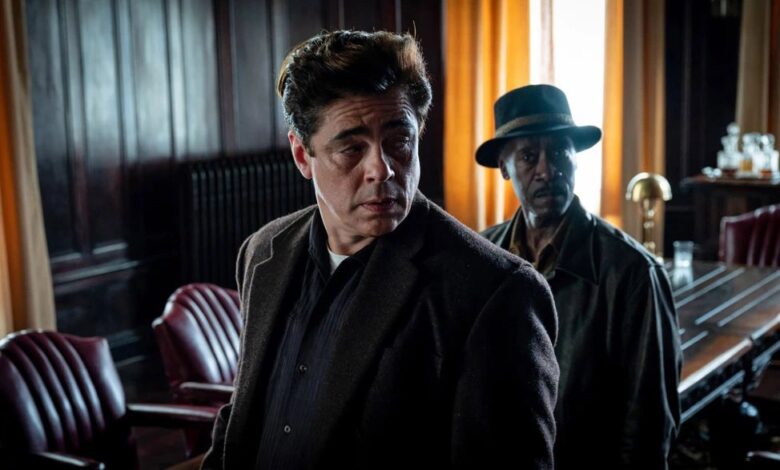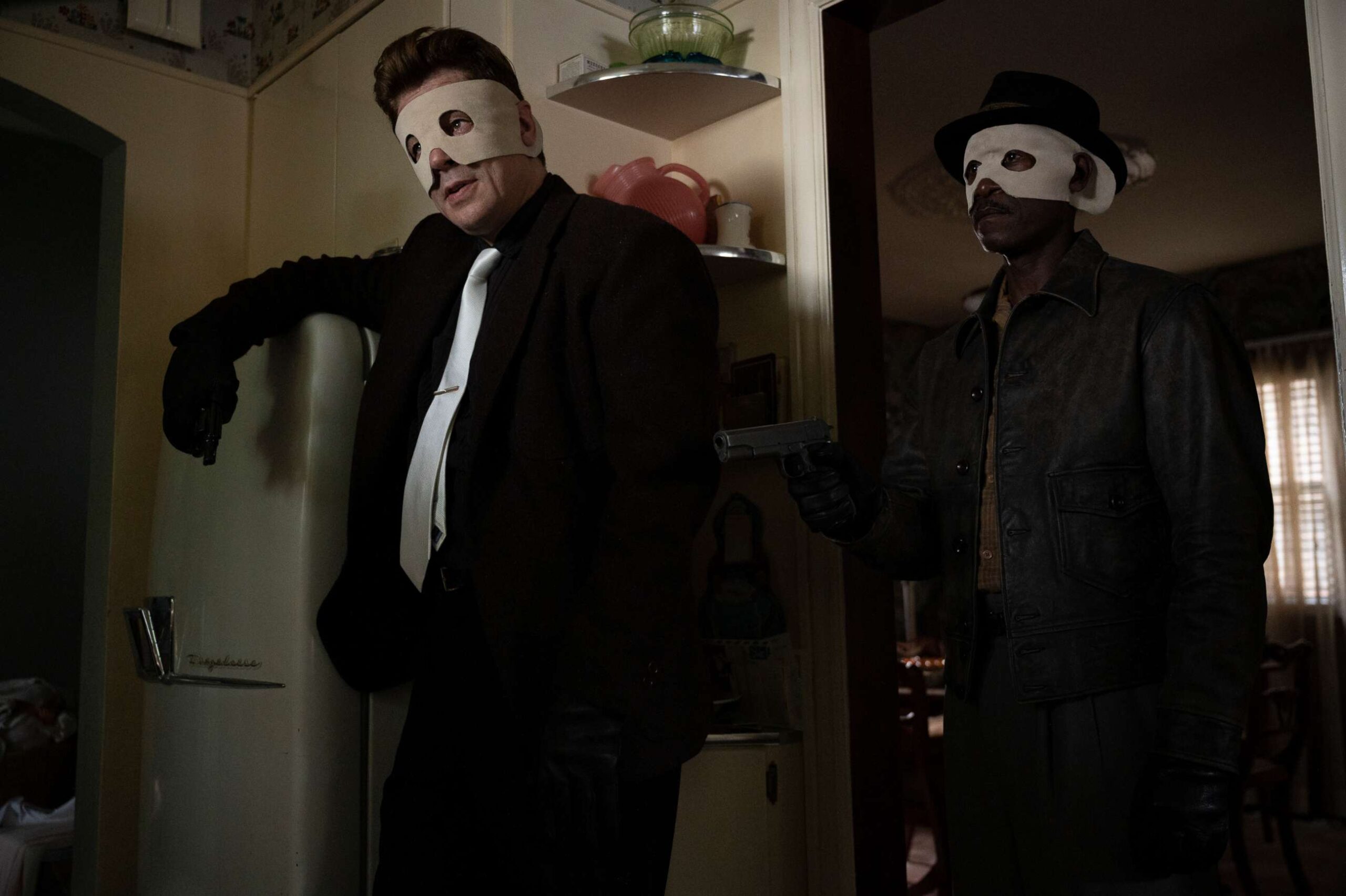
Don Cheadle and Benicio Del Toro play crooks in 1954 Detroit involved in a document theft that grows increasingly tricky in this nimble neo-noir premiering on HBO Max.

Not much separates corporate skullduggery from organized crime in No Sudden Move, which finds Steven Soderbergh playing to his strengths as a buoyant storyteller with a taste for intricate plotting, sardonic humor and crackerjack ensemble work. Double-crosses and side deals stack up one on top of another to create rippling complications in a three-man job as the hired hands try to figure out who they’re working for and flip the deal to their advantage. There’s luxuriant intoxication in the jazzy rhythms and sumptuous visuals of this HBO Max original, which returns the director to turf fertile for him 23 years ago in Out of Sight.
Echoes also are discernible of Soderbergh’s Ocean’s Eleven films, The Limey and Logan Lucky, among others. In fact, the pleasures of a highly accomplished director grooving on twisty genre material pump up a screenplay by Ed Solomon (who wrote Soderbergh’s whodunit series Mosaic and whose long list of credits includes the Bill & Ted trilogy, Men in Black and the Now You See Me films) that ultimately seems slightly less than the sum of its parts. The backgrounding of Detroit’s “urban renewal” program — translated by one jaded Black character as “Negro removal” — is less satisfyingly developed than the fierce competition and ethical elasticity of the auto industry’s Big Four. But that doesn’t make the movie any less zippy and entertaining.
No Sudden Move
Release date: Thursday, July 1 (HBO Max)
Cast: Don Cheadle, Benicio Del Toro, David Harbour, Ray Liotta, Jon Hamm, Amy Seimetz, Brendan Fraser, Kieran Culkin, Noah Jupe, Craig muMs Grant, Julia Fox, Frankie Shaw, Bill Duke, Lucy Holt, Lauren LaStrada, Hugh Maguire, Tina Gloss
Director: Steven Soderbergh
Screenwriter: Ed Solomon
Rated , 1 hour 56 minutes

Ex-con Curt Goynes (Don Cheadle) is the first to be recruited for what’s sold as an easy-money job by evasive middleman Mr. Jones (Brendan Fraser), who claims to be working for a Chicago outfit looking to extend its reach. His contact Jimmy (Craig muMs Grant, who died earlier this year and to whom the film is dedicated) doesn’t inspire much confidence in a job that Curt correctly intuits is “some sketchy shit with a white guy.” But he needs the cash to get back on his feet.
Together with Ronald Russo (Benicio Del Toro), who doesn’t hide his distaste for working with a Black man, Curt will “babysit” the wife and children of mid-level GM exec Matt Wertz (David Harbour), while the team’s smart-mouthed third member, Charley (Kieran Culkin), accompanies him to the office to retrieve a document. Charley counters Matt’s objection that he doesn’t have the combo to the safe of his boss, Forbert (Hugh Maguire), where the valuable document is stored, by revealing, “We understand you have the combo to his secretary.”
That intro, unfolding with a minimum of exposition and leaving us to piece together the puzzle along with the characters, briskly sketches in the tension in the middle-class Wertz household. It also provides Amy Seimetz with juicy fodder for one of the standout performances in an ensemble stacked with incisive characterizations. As Matt’s wife Mary, held at gunpoint by a trio of masked criminals and told to go about her business like she would on any ordinary Monday, Seimetz expertly balances fear for herself and her kids (Noah Jupe and Lucy Holt) with the rancorous suspicion that her husband’s philandering has somehow brought this trouble crashing down on them. Watching the actress smoke furiously and seethe throughout brings tart humor to a movie in which infidelity is a significant motif.
When flustered Matt finds that the document in question has been removed by Forbert, the news doesn’t land well with Jones, who tells them to sit tight until he can relay further instructions from his mysterious employer. But nerves are frayed and someone’s trigger finger gets itchy, resulting in a swift change of plans and a hasty coverup, ushering in Detective Joe Finney (Jon Hamm) of the organized crime task force.
Meanwhile, Curt and Ronald, allied more by necessity than trust, go directly to Forbert’s swanky home to retrieve the document, putting Matt in an awkward position that forces him to be ruthless. In one of Del Toro’s funniest scenes, Ronald keeps an eye on Forbert’s greatly distressed wife (Tina Gloss) during the shakedown, helping himself to a glass of scotch. With the precious paperwork finally in their hands, Curt and Ronald gradually get wise as to who’s pulling the strings and why. But they also get creative about leveraging the asset for the highest possible personal gain, whether it’s as a team or solo.
Solomon’s script is quite clever at continually upping the stakes and shifting the terms of the deal until a wide-reaching conspiracy is exposed — a shocking case of corporate collusion lifted from the history books. As each new wrinkle comes to light, Soderbergh keeps the action wound tight, zigging and zagging like a well-oiled machine. Like Cheadle in the fabulous opening, in which Curt walks from the historic Black Bottom neighborhood into increasingly gentrifying (read: white) suburbia, the film saunters along to the coolly propulsive sounds of regular collaborator David Holmes’ score, a slinky evocation of period jazz with percussive elements to up the intensity.
The constantly evolving job also draws a bunch more colorful types out of the woodwork, including local crime boss Frank Capelli (Ray Liotta), someone seemingly nobody wants to work with; the kingpin of the Black criminal class Aldrick Watkins (Bill Duke), whose missing “code book” detailing 10 years of debts, bribes and scores to settle adds to the intrigue; and a well-connected auto-industry business executive played in a droll turn by an unbilled major star who’s been a frequent Soderbergh collaborator. “I did not create the river, I am simply paddling the raft,” he says, conveniently exonerating himself for the corruption rife in the city by leaning on the tenets of American capitalism.
There are also choice developments concerning the women caught up in the scenario, who take matters into their own hands, looking out for themselves with amusing single-mindedness. That includes Forbert’s secretary Paula (Frankie Shaw), and especially, Frank’s resourceful wife Vanessa (Julia Fox). Everyone in this film’s depiction of the booming city is either trying to maintain or better their place on the class ladder or grab hold of a rung, and nobody’s hands are clean.
The lynch pin binding it all together is Cheadle’s unflappable Curt. He also serves as the story’s soulful representation of Detroit’s disenfranchised African American population; the I-375 freeway is literally about to plow through the main residential street where his ex, Clarisse (Lauren LaStrada), lives. That said, the script doesn’t dig deep enough in its observation of the Black community’s power structures, and how Watkins’ numbers racket intersects with both the business world and other crime factions. There’s a comment being made about wealth disparity but it gets a little lost in the bouncy narrative shuffle.
Still, who’s complaining with these actors in a movie that looks this good? Hannah Beachler’s period production design etches fascinating detail into the up- and downscale contrasts of a city in a moment of accelerated transition. And Soderbergh, shooting under his regular DP pseudonym of Peter Andrews, is as dynamically limber as ever, with endless Dutch angles to keep skewing our perspective on the shifty characters. The film’s title might adhere to the 1950s noir template, but the camerawork and editing (Soderbergh again, as Mary Ann Bernard) are full of sudden moves that contribute to the exhilarating storytelling.





